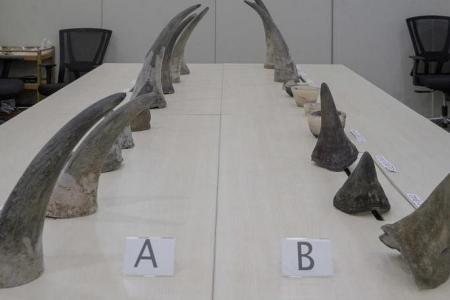Jail for man caught with rhino horns worth over $1.2m
A South African man who was caught with Singapore’s largest-ever seizure of rhinoceros horns –worth more than $1.2 million – was sentenced to two years’ jail on Jan 26.
Gumede Sthembiso Joel, 33, had earlier pleaded guilty to two charges under the Endangered Species (Import and Export) Act 2006.
He was arrested in 2022 while on transit here on his way to Laos.
Gumede had unlawfully brought 20 horns from Johannesburg in his home country to Changi Airport Terminal 1 on Oct 4, 2022.
The prosecution said that 18 of these horns, which weighed nearly 32kg in total, were from 15 poached white rhinoceroses, which are endangered.
The remaining two horns, weighing more than 2.7kg in total, were from a critically endangered black rhinoceros.
Gumede had brought in all the horns without valid export or re-export permits issued by the relevant authorities in South Africa.
The permits should have come from the Convention on International Trade in Endangered Species of Wild Fauna and Flora (Cites), which regulates wildlife trade, and of which Singapore is a party.
Deputy Public Prosecutors Eric Hu, Ng Shao Yan and Lee Da Zhuan stated in court documents: “According to Cites, the total number of white rhinoceroses stands at an estimated figure of 18,067, while there are only less than 5,000 black rhinoceroses out in the wild today.”
They said 15 samples of the horns seized were traced to 11 female rhinoceroses.
“The reproduction of such species could have been halted as a result of possible illegal poaching activities,” they added.
The prosecutors also said that illegal trade in such horns threatens the existence of the rhinoceroses and fosters a thriving black-market economy.
Investigations revealed that another South African man, Mr Jaycee Israel Marvatona, had bought the horns from illegal poachers in South Africa and arranged to sell them to one “Jimmy” for delivery in Laos.
The DPPs said that rhinoceros horns carry a high trade value and are treasured for their use in Chinese medicine and ornamentals.
In Vietnam, it has been rumoured that the horns can “cure cancer” and are highly sought after by those who are more affluent. The horns are also often presented as gifts to the elite.
The prosecutors told the court: “The poaching of such endangered species had led to unnecessary suffering to these rhinoceroses. Most of the poached rhinoceroses would die instantly.
“In some cases, horns are cruelly removed from live rhinoceroses, leaving them to die slowly from facial wounds. Such inhumane treatment of rhinoceroses is intolerable.”
According to court documents, Gumede had known Mr Marvatona for two or three years.
Since July 2022, he had known that Mr Marvatona was involved in the illegal rhinoceros horn trade.
Mr Marvatona would send images and videos of rhinoceros horns to Gumede via WhatsApp relating to the sale of such items.
Some time in or before September 2022, Mr Marvatona asked Gumede to transport some horns from South Africa to Laos, through Singapore.
He also told Gumede that he would make his trip “worthwhile”, providing return tickets as well as an undisclosed amount of cash.
Gumede agreed to transport the horns, and he tried to recruit a South African man, Mr Chad Berry, to accompany him to Singapore on Oct 3, 2022.
However, he failed to do so, despite offering Mr Berry around $2,230 to fly with what was referred to as their “package” to either Laos or Vietnam.
On Oct 3, 2022, Gumede took a flight from Johannesburg and landed in Singapore at around 7am the next day.
He had planned to travel to Vientiane in Laos on another flight about two hours later.
However, his journey came to a halt when a baggage screening officer, who was examining X-ray images of transit luggage, noticed that two boxes contained multiple organic items shaped like horns.
The boxes also had baggage tags that bore Gumede’s name.
The officer alerted her supervisor and the boxes were taken for further inspection.
A public announcement was then made asking Gumede to report to the Changi Airport Police Command.
After that, he was escorted to an inspection room within the airport and the horns were uncovered.
DNA analysis by experts from the National Parks Board confirmed that they were genuine horns.
An expert from the Veterinary Genetics Laboratory at the University of Pretoria in South Africa also confirmed that the horns came from 15 southern white rhinoceroses and one black rhinoceros.
Get The New Paper on your phone with the free TNP app. Download from the Apple App Store or Google Play Store now


